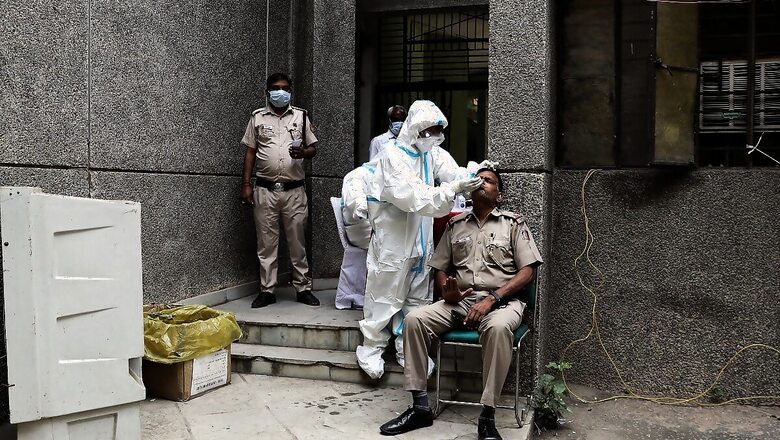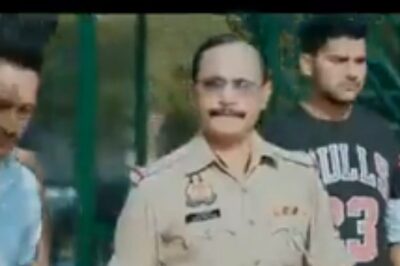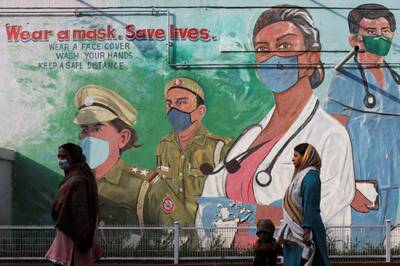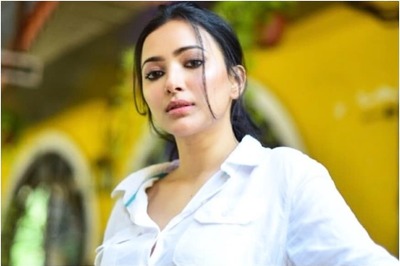
views
The skyrocketing Covid-19 numbers in the national capital have perturbed residents, administrators and healthcare experts, while also throwing up a slew of questions and rumours. In a candid and exhaustive interview with News18, Dr SK Sarin, director of the Institute of Liver and Biliary Sciences (ILBS) who also heads the five-member expert committee formed to assist the Delhi chief minister to tackle the pandemic, spoke about a range of issues including the debate over a third wave in Delhi, the reasons behind the surge in cases, and the treatment options available, while painting a sobering image of what may lie ahead.
News 18: Delhi has recorded more than 6,500 cases for two consecutive days and more than 5,000 cases for five days in a row. How do you read the situation? Some people are calling it a third wave? What are the reasons for the current spike?
Dr SK Sarin: Well, it is a little worrisome thing, Rupashree, and I had predicted this a few days ago. The way you look at people, they are moving around without any social distancing and not keeping any norms of wearing the mask. So it is going to spiral. Whether you call it a third wave or a community spread, there is a likely surge in the number in the month of November and December.
So let us understand, like any common flu, the flu occurs in one member of the family and it spreads. So Covid is also spreading like any common flu spreads. But the problem is the mortality.
So what Delhi is witnessing is rather unique than any other city or place in the country, which is a little worrisome. And this could be because of the way people are living or the movement of people.
But whatever is the reason we need to be careful for at least 2021. If someone would ask me, ‘What is your top priority?’ I would say you should combine the science, the public health, the people who are able to reach to the people and have policymakers indulging in it till December 2021. We need a clear road map of 2021.
And to have a road map, all the cards in science must be put on the table . If you recall the days of HIV, when AIDS and HIV came, there was no drug, there was no vaccine. We still don’t have a vaccine for HIV. Imagine, it is like forty years! People are living with it. And the only way was behavioural intervention: protected sex and all those things were publicly known and people understood it. And those who did not understand, those societies and communities, they had problems. So the behavioural intervention at that time took at least a decade for people to understand. And I am happy to say for SARS-CoV-2 , or for corona, people have understood it. But now they are slightly forgetting it. So a behavioural change is a mental change and I think we need to again and again say this part that masks, and the type of masks that I am wearing (N95) is absolutely essential.
More so like the Delhi state now. You have smog everywhere. The droplets, the aerosols may hang on for longer period. Like, if I speak loudly, in one minute, I will throw out one thousand particles of the virus. If I am infected, if I take out this mask while speaking, in one minute of my speaking, not singing, not coughing, not sneezing, just speaking, I can throw out one thousand viral particles and which will go in the corner of my room…So never take out the mask while speaking… And that is bigger than any vaccine…
The behavioural mindset is the fundamental part that we have to do for the next one year.
In addition, what all can you as a society do? Well, I think, we have to make the community, a community worker. We always say, ‘Bhai public health ka hai, woh health worker aayega, ASHA aayegi, somebody else will come, doctor aayega, nurse aayegi.’ No. Today, the community health worker is the community. The community itself has to understand how to go about it.
I will give you an example. If you have a person in the family who is infected. Three days prior, you have found that he has some slight sneezing or slight cough, no fever and you start using a mask – that is a very big study from China – no symptoms apart from slight sneezing or running of nose and if family members start wearing a mask, the risk is reduced from 1 to 2. All that fivefold risk of transmission in the family decreased. How important it is! You don’t have to think about the country. Think about your family. Think about your mohalla. At the evidence of slight symptom, if you wear a mask, you are protected.
Second very important part is, if somebody has got fever, he spreads. But fifty per cent infections are without any fever, without any symptoms. So, half of the people will never have symptoms, half of the people will keep transmitting.
Coming back to Delhi and why Delhi is having a surge, I really think that there is a spread and if you count the numbers which had gone down, it could be partly because we were not adequately testing at that time. So I think, we have to be very clear in our mind that testing is required and more and more good quality testing. The second part in the increase of numbers could be earlier we were going, doctors were going, teams were going to test. Now people are coming to get tested. Who are getting tested? Family members – one was positive, four others have come, servant has come, the whole society has come. So now the way people are testing, getting investigated is a different population than the population that was there in the earlier part. So high positivity is worrisome, but it could also be we are testing differently.
News 18: You talked about a community spread as opposed to a third wave.
Dr S K Sarin: Community spread is where the person who is infected does not know from where it came. And like all hospitals in Delhi are testing every patient who is coming – we are testing at ILBS, not only the patient but the attendants and the relatives too. We find, many times, patient has no infection, not positive, but the relatives are positive. From where have they got it? Now, this relative would have transmitted to the patient and of course to the others. So we keep, of course, distancing. So what I am saying is if we test a thousand subjects in a day, fifty to sixty are positive but they don’t know the source…from where have they got it? So this way, I think there is a silent community spread. Another reason for community spread in Delhi is when the actual number of cases in Delhi was about a lakh or so and that is about one per cent of Delhi’s population, our antibody positivity rate was close to 23 % …So these were silent infections, low-grade virus transmission, because of which I think the virus has gone in. Now there is a need that we do large-scale antibody surveys across the country, not just in Delhi.
In fact, there has to be a formidable plan based on which to find out which zip codes, which areas are the trouble-making areas. This is what was done in many other countries.
Also there is a question, whether in festival season cases will increase because people will take off their masks … There is a huge risk which Delhi and many other parts of the country will be having…
News18: What do we mean when we say ‘wave’? How are waves defined?
Dr SK Sarin: Waves are defined in a way…You had a decline, your reproduction number has gone down from 1 to 0.5 or even lower. So if one person was infecting one, it is a plateau. If two persons are infecting one or let’s say ten infected infect ten, it is a plateau. It means no increase, no decrease. If ten people make twenty, it is a rise. If ten infected make only five people infected, it is a decline. So when there is a decline, you say the virus is going away. There were some signs that Delhi was showing fewer number of people. So everyone thought that there will be a decline and tomorrow would be a good day. But again the numbers have started increasing. So, it could be a wave, it could also be the way we are testing more aggressively and the population that we are testing may be different. So I do not deny that there is a third wave but it is also possible that more and more family members, or infected subjects, or patients are being tested. However, this is also possible that people thought, ‘So I got Covid, I cannot get Covid again’. But the antibodies do not last. It is very well known now and as the science is growing we know that some of the antibodies last maybe four months, maybe six months, maybe even less. So those who got the virus once should not think that they are protected for life.
News18: Talking of ‘wave’… and this is purely for understanding, in Delhi, we perhaps reached a plateau, but did we ever reach a position where the reproductivity rate actually went down?
Dr SK Sarin: See, we were having four thousand patients at a time and we came down to less than a thousand for three days. So that was possible that we all thought that there was a decline. The numbers had gone down , gradually… It was not one day…There was truly a decrease in number. And this has at least occurred on two occasions. So it is right to say that there was a total decline, there was a slope, and again it rose up. But whether the third wave, or the way we are increasing the numbers will continue to surge, we cannot say right now.
News 18: You mentioned a study in China which showed the importance of wearing masks. Can you please elaborate on that?
Dr S K Sarin: The study is that family members always think that ‘my house is clean, it is like Ganga jal, it is like no virus there but it is not possible. If you have a person who is infected and if he is coughing, of he is sneezing, there is a high chance (of Covid), and if he has fever, all the more reason that he will be looked after by an attendant and if they are not wearing mask for protection, they are bound to get it.
And generally, by the time the symptoms have come – earlier was three days, one was pre-symptomatic and even earlier than that patients can transmit the infection in the first five days.
The Chinese study showed that – what we call hazard ratio – hazard ratio decreases from 1 to 0.21, five times decrease, if the family members wore the mask.
So my suggestion is if anyone in your family has corona, please think that you have and if you are not infected, protect yourself, protect others , no visitors …. That is the basis of self-isolation.
News 18: In Delhi, for instance, people say that pollution is leading to a spike in infections. Are there any reliable studies that demonstrate the relationship between pollution and Covid?
SK Sarin: Well, pollution and also winter. There are two factors right now. Delhi is having surprisingly low temperatures and in winter, this virus persists longer and the virus also mixes with other viruses like dengue, like normal common flu. So if somebody gets one, maybe they will get two infections.
Whether the virus persists longer in smog or pollution, there are some studies, but nothing very strong to say that…
News 18: So nothing to say for sure that pollution leads to greater spike in Covid?
Dr S K Sarin: No, not really.
I forgot to communicate to you the importance of antibodies. Again, like if hundred people get the virus, only those who have got high fever, cough and cold and symptoms – they get good antibodies. Those who are asymptomatic, in fact the antibodies are produced but they do not reach their tether… These are very recent, two to five-day-old data. So we must understand that everybody who has got infection will have antibodies that will last is not correct. Suppose, you are doing a plasma donation – there has been some debate about whether giving convalescent plasma is good or it is not good – it all depends on the antibodies level.
Now there are two types of antibodies – one is neutralising antibodies and one is simple IgG antibodies. So earlier people were saying anybody who has got antibodies, IgG…give plasma, it is good. But only 30% to 40% of people with plasma have good neutralising antibodies.
So, we need to be sure what kind of plasma is being given and also remember that don’t get it before four weeks. Someone has corona, has recovered, it takes time, at least four weeks to make antibodies, not three .
News18: So, would you recommend the use of plasma therapy still ?
Dr S K Sarin: Certainly. There is some debate. I think the Indian studies have not shown very much survival benefit but that is true for any … Is there any drug? There is no drug. For HIV we got thirty drugs now but for ten – twenty years there were no drugs . So, to expect that you have a pipeline of drugs is not possible . And drugs are required for three phases – pre exposure prophylaxis , during exposure that is when you have the infection and post exposure prophylaxis. We have nothing. But for exposure or for disease , definitely plasma and which kind of plasma and I think there is very recent data, I think a week ago, two or three studies have come which show that today it is one of the most promising therapies but the quality of antibodies is very very important.
Governments all over the world have given IgG of 640, but now the study says IgG level should be more than 1,340. So more than 1,000 level of the IgG will give you an antibody which has neutralising antibodies. So they will just go and bind the protein of the virus. So in my opinion today plasma therapy has a role. Plasma therapy is the only way by which you can provide some antibodies against the virus.
How do you neutralise the virus? There are two ways – one by antibodies, and one by drugs. We don’t have drugs , so antibodies. Another important thing – how do you make your immunity better? There are two ways- one is active, one is passive. Active immunity is vaccine – give a shot of the virus or its protein and you make antibodies. That is active immunity. What is passive immunity? Somebody else has made the antibody and gives it to you. So, plasma is like a passive immunotherapy. You take out immunoglobulins, concentrate them and give it.
News 18: Keeping in mind the situation in Delhi, what would you suggest to governments, policymakers?
Dr S K Sarin: When you give a vaccine, like say vaccine is available from February 1, the vaccine must fulfil certain criteria. One criterion for the vaccine is after the last dose, two months later there should be no side effects. WHO says three months but under the emergency utilisation you can decrease it to two months.
Secondly, the vaccine may give you antibodies just for four months, it is not lifelong. We are learning about the immunity of this virus slowly. So, suppose somebody gets a vaccine in February or March, we do not know whether he will in December 2021 have enough antibodies.
News18: So we will have to have these behavioural changes. We will have to have these masks for quite a long time, we have to get used to this.
Dr S K Sarin: Participation of the community, their engagement, teaching them – we are not making news by saying this or that- what I want to communicate through you and your channel is that we have to be vigilant at our home, at our workplace and also for the community. And no mask, no entry; no mask, no talking.
Keep yourself highly alert. Everybody who is elderly, above 65, does not require to be in the hospital. If he does not have fever and his saturation is OK, I think we can keep that person in the house. But if saturation goes below 93% or he gets mild symptoms of cough and other things, he is high-risk. But if there is no symptom, he can very well be managed at home.
We need to decentralise all our services and people have to understand that everything cannot be and should not be expected from the government. If RWAs look after cleanliness, if RWAs look after security, why can’t RWAs look after their corona people who are not going to the hospital. We will not need ASHA workers if RWAs work together.
So my message would be to be ready with a road map for 2021. We have made many mistakes. We have made the mistake of ignoring wearing a mask. Mid-term correction is a must.
Till 2021 December at least, till the result of the vaccination, efficacy, safety, availability of the vaccine is standardised, we have no way.
Also my message would be any festivity, any place, don’t open your mouth. I see doctors, they have operated together, after the operation, there is a common habit of eating together where they all sit in the lounge and have food together, and the next day you find, the patient was positive. Now one doctor is positive, one anaesthetist is positive, another guy is positive for no mistake except eating together. If you are calling somebody, send an electronic samosa, an electronic gulab jamun, an electronic rasmalai … But don’t spoil your post-festival time with corona.
News 18: Every time I have spoken with you, I have come away hopeful. But today I feel a lot of despair. There is no way out it seems.
Dr S K Sarin: Very few people will speak the blunt truth. The blunt truth is no vaccine as of now has a clarity that their antibodies will be for six months. Earlier, good vaccines required three years! You have to see the antibody last for long.
You have started vaccination in February; till at least March-April you have seen antibodies have come up. Four months-six months, antibodies are there. If they stay for eight months, we are lucky. If they stay for 2022, we are very lucky. But as of now those who have got the virus, you have got the full virus, still their antibodies disappear in a proportion in about 30-40%. And some people never make antibodies. Like in Hepatitis E, in some people, antibodies are not formed at all.
So people who are hoping that life will change after vaccine tomorrow may be disillusioned by my saying this but this is the blunt truth my friends.
News 18: What about mortality?
Dr S K Sarin: Yes. Mortality is certainly a cause for concern. Mortalities occur in different ways and no single cause for mortality can be given. But I think delayed response in going to the hospital is one such thing.
What is worrying is that in some of the patients, the attack of the virus is so bad that what we call the cora score, the way you score the lung injury, can become high from 6 to 12 to 20 in very short time and these people do not respond to steroids and there is no anti-viral drug.
So I think, what the government has prescribed, a cocktail is to be used in patients very carefully but mortality is higher with this virus. This virus is notoriously bad.
News 18: In Delhi also the mortality is going up now?
Dr S K Sarin: I am not sure. Numbers have gone up. This could also be the populations who were already in the hospitals for a time and now they have died. Mortality is fourteen days from the time of infection or twenty-one days. So say sixty people die but they must have been admitted not during what you call the wave but even before the wave. In reality, the number of deaths increasing will come to us post Diwali if they are increasing truly. Otherwise this is a kind of bank which we had earlier.
News 18: In the pantheon of terrible diseases from leprosy to cancer, which instil fear in you, where would you place Covid?
Dr S K Sarin: Ebola was not good. We did not see it in India but as I read, it was bad. I would consider one per cent mortality in any disease to be quite high. It is not a small number. Hepatitis – people who have Hepatitis B have acute infection, one per cent would die. Hepatitis E, maybe a little less. Hepatitis A also a little less. So I think we are very close to that. HIV, the deaths are not there . It is just the virus. So those diseases which cause acute infection, like you would say severe acute diarrhoea, even then people do die.
I don’t want to put fear in the minds of people but I want to clearly communicate that you as community health worker, every single citizen of India should be a party. Otherwise, epidemics, pandemic never finish without public participation.
Also, remember that Covid has put undue stress on doctors, nurses. We are seeing many many more patients who are coming sicker than they were earlier. I saw a lady, she could not come from far off and now her tumour is so big, her liver cancer has spread beyond treatment. So those who require monitoring, should continue to get monitoring whichever way: locally, if not, go to some place. Do not forget that your disease is not waiting for Covid to get over. So hospitals should be witnessing sick patients due to non-Covid infections; the care of these patients is equally important and that is the responsibility of the doctors to communicate.
Another interesting problem…I will say it but people will not like it. Almost 30% of the patients gained five to seven kg of weight. Anybody who I saw was 65 kg, now is 72 kg. Do not gain weight during Covid, it is going to insult you for long. Covid may hopefully go away, but this weight will not go away easily.
Read all the Latest News, Breaking News and Coronavirus News here




















Comments
0 comment